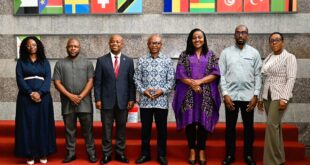A Critical Analysis of Systemic Racism in German Family Law
![]()
The treatment of Black parents and children within Germany’s family law system, exemplified by the ongoing separation of a Black man and his young son, reveals deeply embedded structural inequities that amount to violations of international human rights law, writes Amal Abbass*. Through legal, historical, sociological and intersectional lenses, she traces how institutional neglect, epistemic injustice and racial bias converge to deny Black families fundamental rights — most painfully, the right to remain together.
![]()
“Ich will Papa”
For months, a young Black child in Germany has expressed — again and again — that he misses his father deeply. His father, a Black man living with a disability, has been cut off from contact for over a year despite there being no evidence of harm and despite a previous loving, close bond.
Court documents in the case show chilling reasoning: the restriction was justified because “the requested contact is not necessary to avert acute or significant harm.” In practice, this means that unless a child is visibly endangered, long-term severance of parental bonds is tolerated. The child’s need for love, identity, and cultural continuity is overlooked.
Epistemic Injustice and Institutional Racism
Black parenthood in Germany is frequently devalued through racial stereotypes. Professional judgments by youth welfare offices and court-appointed guardians often rest on assumptions — of irresponsibility or incompetence — rather than careful engagement.
In this case, the youth welfare office never carried out a direct home visit to the father. At various stages, social workers excluded him from key mediation meetings or based decisions on unverified assumptions about parental conflict. These practices exemplify epistemic injustice: discounting the voices, experiences, and credibility of Black fathers under the guise of neutrality.
Misinterpretation of Medical Findings
Suspicion against the father escalated due to a misread toxicology report. A court guardian initially claimed that a controlled substance was found in the child’s bloodstream. Medical specialists later clarified that no such blood test was conducted; instead, a hair analysis detected minimal traces consistent with passive environmental exposure — levels considered not indicating ingestion or endangerment.
By the time this clarification was issued, the allegation had already influenced proceedings. The correction was neither directly communicated to the father nor reflected in the youth office’s ongoing position. Such procedural opacity deepens mistrust and harm.
Intersectional Blind Spots: Race, Disability and Class
The father’s lived reality — Black, disabled and economically under strain — does not fit normative expectations of German parenthood shaped by whiteness, able-bodiedness, and middle-class stability. Instead of recognition, his situation is met with bureaucratic suspicion. Even the fact that he uses prescribed medical cannabis — lawful and closely monitored care — has been weaponized against him.
Family law structures lack an intersectional approach and instead reproduce disadvantages at every stage.
Legal Contradictions and International Failures
Germany has ratified the UN Convention on the Rights of the Child (UNCRC), committing to:
• Article 8: The child’s right to preserve their identity and family ties.
• Article 30: Protection for minority children to maintain their culture and heritage.
• Article 3: The best interests of the child must guide all decisions.
Yet current legal practice — separating a child from a capable father absent “acute harm” — contradicts these standards. It also conflicts with the International Covenant on Civil and Political Rights (ICCPR) and the International Covenant on Economic, Social and Cultural Rights (ICESCR), both guaranteeing family unity and non-discrimination.
Unequal Access to Justice
Though he is the child’s legal parent, the father has had to bear repeated legal costs. Meanwhile, state institutions — including the guardian ad litem, youth welfare office, and court system — are publicly financed. This imbalance forces marginalized families to struggle financially for rights that should be guaranteed.
Even sympathetic lawyers often caution clients against pursuing cases, citing the entrenched alignment between courts and child welfare offices. For many, justice depends less on law than on resources — a systemic failure in itself.
Cultural Needs of Black Children
Research has long shown that Black children’s well-being depends on maintaining cultural ties and family bonds that affirm identity. When courts sever these ties without cultural understanding, they not only harm the child emotionally but also perpetuate intergenerational trauma.
As scholar Patricia Hill Collins noted, Black parental care serves as an essential defense against racial devaluation. German courts, however, rarely include such cultural considerations in “best interest” assessments.
Towards Transformative Justice
To move toward equity, structural reforms are necessary:
1. Afro-diasporic advisory panels: Modeled on First Nations practices, these panels could inform proceedings involving Black children with cultural expertise.
2. Mandatory anti-bias education: Judges, social workers, and guardians must undergo continuous anti-racist training rooted in Germany’s realities.
3. Culturally responsive welfare assessments: The “best interest” standard must include identity, emotional belonging, and cultural heritage.
4. Transparency and accountability: Misinterpretations of expert reports must have formal consequences; parents must be given timely access to case evidence.
5. Equitable legal aid: Access to high-quality, independent representation must be ensured for marginalized parents, supported by civil society organizations.
Final Reflection
The prolonged separation of a child from his Black father in Germany is not a bureaucratic mishap—it is a systemic failure. It reveals how institutions fail to listen to children, pathologize Black parenthood, and resist acknowledging errors.
The child’s ongoing plea to be reunited with his father exemplifies a truth beyond legal abstraction: family bonds are not optional. They are a right.
* The author, Amal Abbass, is a transcultural sandplay therapist, social entrepreneur and co-founder of tubman.network e.V. For decades, Abbass has advocated for equality and intersectional justice, spearheading creative, community-rooted initiatives to empower Black and migrant communities
 THE AFRICAN COURIER. Reporting Africa and its Diaspora! The African Courier is an international magazine published in Germany to report on Africa and the Diaspora African experience. The first issue of the bimonthly magazine appeared on the newsstands on 15 February 1998. The African Courier is a communication forum for European-African political, economic and cultural exchanges, and a voice for Africa in Europe.
THE AFRICAN COURIER. Reporting Africa and its Diaspora! The African Courier is an international magazine published in Germany to report on Africa and the Diaspora African experience. The first issue of the bimonthly magazine appeared on the newsstands on 15 February 1998. The African Courier is a communication forum for European-African political, economic and cultural exchanges, and a voice for Africa in Europe.




































